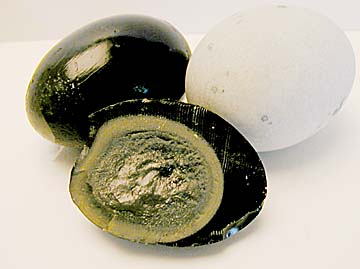

Key Ingredient

|
Preserved duck eggs
The Chinese are masters at food preservation, creating items that can be considered exotic to Western palates, but are everyday fare for the Chinese table. Preserved duck eggs are one of those mind-boggling delicacies.
Who but the Chinese would come up with such intricate methods for enjoying an egg?
The basics: Duck eggs are preserved in two ways. Salted duck eggs are simply stored in salt and a mud paste for about a month. These eggs need to be cooked before eating.
The more infamous type is called pidan or sometimes thousand-year-old eggs. These duck eggs are preserved in salt, a variety of wood ash, lime and black tea. Rice husks are used to cover the eggs to prevent them from sticking together.
The eggs are then packed in earthenware urns for 100 days. In that time, they are transformed into solidified, dark amber or blackish-blue jellylike ovums with dark green yolks.
Duck eggs are used instead of chicken eggs because they are richer and their yolks fattier and better suited to preserving. The texture of these eggs has been compared to avocado, while the flavor is uniquely pungent and cheeselike.
Many myths surround these eggs, such as the use of horse urine and a process involving years and years of preservation. However, they are just that: myths.
Selecting: Salted duck eggs look very similar to regular eggs and are generally sold refrigerated in bags of six. They may also be purchased cooked. Thousand-year-old eggs may be found with the black ash still covering the egg, or all cleaned up and stored in little foam boxes. They have a distinct aroma and can look quite intimidating.
Storing: Keep preserved duck eggs in the refrigerator. The salted eggs should keep for about a month, while the thousand-year-old eggs are good for four to six months.
Use: Cook salted duck eggs in their shells before consuming. They are often used in pastry fillings or jung (a bundle of mochi rice wrapped around pieces of pork).
Thousand-year-old eggs must be thoroughly cleaned and rinsed of any black ash coating. No cooking is necessary. They are usually peeled, quartered and served with a dipping sauce of soy sauce, vinegar, rice wine and minced ginger. They are also popular for breakfast served with congee.
Where to buy: Preserved duck eggs are available year-round at Asian markets and in Chinatown. Prices range from 99 cents to $1.99 for a half-dozen eggs.
Food Stuffs: Morsels
Eleanor Nakama-Mitsunaga is
a free-lance food writer. Contact her
online through features@starbulletin.com